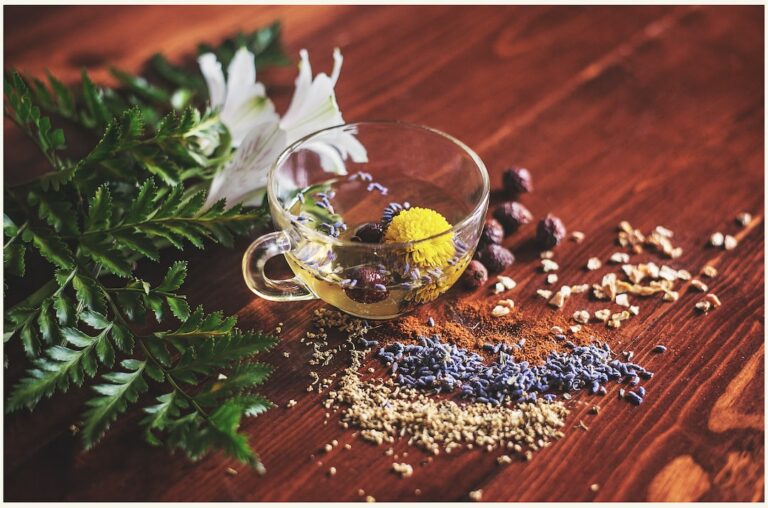Introduction
Definition of herbs
Herbs are plants that are valued for their medicinal, culinary, and aromatic properties. They have been used for centuries in various cultures around the world for their healing and therapeutic benefits. Herbs are typically characterized by their strong flavors and fragrances, which are derived from their essential oils. They are known for their ability to enhance the taste of food, promote digestion, and provide relief from various ailments. Some of the most commonly used herbs include basil, rosemary, thyme, and mint. These herbs are rich in antioxidants, vitamins, and minerals, making them an essential part of a healthy diet. The cultivation and use of herbs date back to ancient times, and they continue to be an important aspect of traditional medicine and culinary practices today.
Importance of herbs in medicine
Herbs have played a crucial role in medicine for centuries. They have been used for various purposes, including the prevention of superbugs. Superbugs are antibiotic-resistant bacteria that pose a significant threat to public health. By incorporating herbs into medical treatments, researchers have discovered their potential in combating these resilient bacteria. The use of herbs in medicine has shown promising results in preventing the spread and development of superbugs. These natural remedies offer a sustainable and effective solution to the growing concern of antibiotic resistance.
The search for the mother of all herbs
The search for the mother of all herbs has been a topic of great interest and speculation among botanists and herbalists for centuries. Many ancient civilizations believed that there must be one plant that possesses the ultimate healing properties and is the source of all other medicinal herbs. This quest for the mother of all herbs has led to numerous explorations, investigations, and studies. While there is no definitive answer to which plant holds this title, several candidates have been proposed throughout history. These include ginseng, aloe vera, and turmeric, all of which have been revered for their therapeutic benefits. Although the search continues, the knowledge gained from studying these plants has significantly contributed to the development of herbal medicine and our understanding of the healing properties of various herbs.
Historical Background

Ancient civilizations and their use of herbs
Ancient civilizations have long recognized the power of herbs and their various uses. From the Egyptians to the Greeks, these early societies understood the medicinal properties and spiritual significance of plants. Herbs were used for healing ailments, promoting fertility, and even in religious ceremonies. The Egyptians, for example, believed that herbs had the power to ward off evil spirits and protect against diseases. The Greeks, on the other hand, used herbs in their medical practices and believed in the concept of balance in the body. These ancient civilizations laid the foundation for the use of herbs in modern medicine and continue to influence herbal practices today.
Early herbalists and their contributions
Early herbalists have made significant contributions to the field of herbal medicine. They were the pioneers who studied and documented the properties and uses of various herbs. Their knowledge and discoveries laid the foundation for the development of modern herbal medicine. These herbalists conducted extensive research on herbs similar to Xanax, aiming to find natural alternatives for anxiety and stress relief. Their findings have provided valuable insights into the potential benefits and effects of these herbs. Today, their contributions continue to inspire and guide herbalists in their pursuit of understanding the therapeutic properties of plants.
The concept of a mother herb in traditional medicine
The concept of a mother herb in traditional medicine is a fascinating and important aspect of herbalism. It refers to the belief that there is a single plant that is the source or origin of all other herbs. This plant is considered to be the ultimate healer and possesses a wide range of medicinal properties. The idea of a mother herb has been passed down through generations and is deeply rooted in various cultures around the world. In traditional medicine, the mother herb is often used as a foundation for creating herbal remedies and is highly respected for its healing abilities. It serves as a guiding principle for herbalists and helps them in formulating effective treatments for various ailments. The concept of a mother herb highlights the interconnectedness of nature and the profound wisdom that can be found in the plant kingdom.
Candidates for the Mother of All Herbs

Ginseng
Ginseng, also known as the ‘King of Herbs’, is a popular medicinal plant that has been used for centuries in traditional Chinese medicine. It is native to the forests of Northeast Asia and is characterized by its fleshy root and unique shape. Ginseng is highly valued for its numerous health benefits and is believed to enhance vitality, improve cognitive function, and boost the immune system. In addition to its medicinal properties, ginseng is also used in culinary preparations, particularly in traditional Asian cuisine. One such example is the use of ginseng in cooking cinnamon-infused dishes, where it adds a subtle yet distinct flavor. The combination of ginseng and cinnamon creates a delightful aroma and taste that is often enjoyed in soups, teas, and desserts. With its rich history and versatile uses, ginseng continues to be a revered herb in both traditional medicine and culinary practices.
Turmeric
Turmeric is a widely recognized herb in the world of natural medicine. With its vibrant yellow color and distinct flavor, turmeric has been used for centuries in traditional Ayurvedic and Chinese medicine. This powerful herb is known for its anti-inflammatory and antioxidant properties, making it a popular choice for promoting overall health and well-being. Turmeric has also been studied for its potential benefits in supporting cognitive function, heart health, and digestive wellness. Incorporating turmeric into your daily routine can be as simple as adding it to your favorite recipes or enjoying a cup of turmeric tea. Discover the wonders of turmeric and unlock its potential as a natural medicine powerhouse.
Garlic
Garlic is a versatile herb that has been cultivated and used for thousands of years. It is known for its pungent aroma and distinct flavor, which can enhance the taste of various dishes. In addition to its culinary uses, garlic also has numerous health benefits. It is believed to have antimicrobial and antioxidant properties, and it may help lower blood pressure and cholesterol levels. Garlic has been mentioned in biblical references to herbs, highlighting its historical significance. The use of garlic in traditional medicine and folklore further adds to its mystique. Overall, garlic is a remarkable herb that continues to be celebrated for its culinary and medicinal properties.
Scientific Research and Findings

Studies on the medicinal properties of ginseng
Ginseng is a popular herb that has been used for centuries in traditional medicine. Numerous studies have been conducted to explore the medicinal properties of ginseng. One of the key areas of research is its potential to boost the immune system against viruses. Ginseng has been found to enhance the immune response, making it more effective in fighting off viral infections. This is particularly relevant in today’s world, where the need to strengthen the immune system against viruses is crucial. By incorporating ginseng into your daily routine, you can take proactive steps to protect your health and well-being.
The anti-inflammatory effects of turmeric
Turmeric is a widely used spice that has been recognized for its medicinal properties for centuries. One of the most notable effects of turmeric is its anti-inflammatory properties. Studies have shown that the active compound in turmeric, called curcumin, can help reduce inflammation in the body. Inflammation is a natural response of the immune system to injury or infection, but chronic inflammation can lead to various health problems. By inhibiting the activity of inflammatory molecules, turmeric can help alleviate symptoms of conditions such as arthritis, heart disease, and even certain types of cancer. The anti-inflammatory effects of turmeric make it a valuable herb in promoting overall health and well-being.
The health benefits of garlic
Garlic, also known as Allium sativum, is a versatile herb that has been used for centuries for its various health benefits. This natural and organic product is not only known for its strong flavor and aroma but also for its numerous medicinal properties. Garlic is rich in sulfur compounds, which are responsible for its distinct odor and many of its health-promoting effects. It has been found to have antimicrobial, antiviral, and anti-inflammatory properties. Additionally, garlic is believed to have antioxidant properties and may help boost the immune system. Studies have also suggested that garlic may have potential benefits for cardiovascular health, as it may help lower blood pressure and cholesterol levels. Overall, incorporating garlic into your diet can be a great way to enhance the flavor of your dishes while also reaping its many health benefits.
Conclusion

The ongoing debate
The ongoing debate surrounding the question of which plant is the mother of all herbs has been a topic of interest among botanists and herbalists for centuries. While many plants have been celebrated for their medicinal properties, there is no definitive answer to this question. However, one group of plants that has garnered significant attention in recent years is foods that kill bacteria. These plants, known for their antimicrobial properties, have been studied for their potential to combat bacterial infections and promote overall health. Researchers have identified several foods that possess antibacterial properties, including garlic, honey, and turmeric. These natural remedies have been used for centuries in traditional medicine practices and are now gaining recognition in modern healthcare. While further research is needed to fully understand the mechanisms and effectiveness of these foods, they offer a promising avenue for the development of new treatments against bacterial infections.
The importance of further research
The importance of further research is crucial in understanding the origins and properties of various herbs. In the quest to determine the mother of all herbs, scientists and botanists have been tirelessly exploring the vast realm of plant species. One of the key areas of focus is the identification of plants that possess exceptional medicinal properties. The best healthcare system in the world relies heavily on the discovery and utilization of these herbs, as they hold the potential to revolutionize medical treatments and improve overall well-being. In order to fully harness the benefits of these herbs, it is imperative to continue conducting extensive research to uncover their hidden potentials and unlock new possibilities for human health.
Implications for herbal medicine
The discovery of the mother plant of all herbs has significant implications for herbal medicine. This groundbreaking finding sheds new light on the holistic health benefits that herbs can provide. By understanding the origins of herbs, herbalists and practitioners can develop more targeted and effective treatments for various ailments. The mother plant serves as a foundation for the vast array of herbs used in traditional and modern medicine. Its identification allows for a deeper understanding of the interconnectedness of plants and their healing properties. This knowledge can lead to the development of innovative herbal remedies and the promotion of holistic health practices.
FAQ (Frequently Asked Questions)

What is the definition of a herb?
A herb is a plant that is valued for its medicinal, culinary, or aromatic qualities. It is typically used in small quantities to add flavor or fragrance to food, as well as for its healing properties. Herbs are known for their natural and holistic approach to health and wellness. They have been used for centuries in various traditional medicine systems, such as Ayurveda and Traditional Chinese Medicine. The term ‘herb’ can encompass a wide range of plants, including leafy greens, spices, and even some flowers. Some of the most commonly used herbs include basil, mint, rosemary, and thyme. These herbs are often used fresh or dried, and can be incorporated into a variety of dishes, teas, and remedies. Overall, herbs play a vital role in enhancing the taste and aroma of food, as well as promoting overall well-being.
Are all herbs medicinal?
Are all herbs medicinal? When it comes to natural medicine, herbs have long been revered for their healing properties. From ancient times to the present day, herbs have been used to treat various ailments and promote overall well-being. The use of herbs as medicine is deeply rooted in many cultures around the world. They are known for their therapeutic effects and are often used in traditional remedies and alternative medicine practices. In addition to their medicinal value, herbs also offer job prospects in the field of natural medicine. Many people are turning to alternative therapies and seeking natural remedies, creating a demand for professionals with expertise in herbal medicine. As the popularity of natural medicine continues to rise, so do the opportunities for those interested in pursuing a career in this field. Whether it’s working as an herbalist, naturopath, or holistic health practitioner, the job prospects in natural medicine are promising. So, if you have a passion for herbs and want to make a difference in people’s lives, consider exploring the rewarding career opportunities in the world of natural medicine.
Can a single herb be considered the mother of all herbs?
A single herb being considered the mother of all herbs is a fascinating concept in the world of herbal medicine. While there isn’t a definitive answer to this question, there are certain herbs that hold significant importance in various traditional healing systems. These herbs, such as ginseng, turmeric, and garlic, have been widely used for their medicinal properties and are often referred to as the ‘cornerstones’ of herbal medicine. They possess a wide range of health benefits and have been studied extensively for their potential therapeutic effects. However, it is important to note that the concept of a single herb being the mother of all herbs is subjective and varies across different cultures and traditions. Nonetheless, these key herbs continue to play a crucial role in promoting overall well-being and are considered essential in many herbal remedies.






































